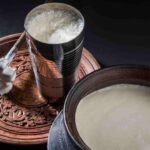Takra or Lassi is a cultured drink, a rich source of probiotics. It finds mention in Ayurvedic texts to treat digestive health disorders. It is a popular household beverage in India.
Takra is also known as chaas. Depending on your taste preferences, it can be made both sweet and salty. Though, the salty version with Indian spices is even more beneficial for its medicinal properties.
Takra is slightly different from buttermilk as it is made from fresh curd, which is sweeter in taste. Buttermilk or lassi, however is sour in taste. As buttermilk is the leftover after churning out the butter.
Takra is prepared by mixing 1 part of fresh curd and 4 parts of water. It should not be too thick or too thin.
In this post, you will find recipes and consumption directions for both sweet and salty takra.
Health Benefits and Ayurvedic Properties of Takra
Takra is light in nature, hence it is easy to digest. It balances Kapha dosha and Vata dosha, but it aggravates Pitta dosha (specifically when consumed in excess or at wrong times).
- Rasa (Taste): Astringent, sour, and sweet
- Virya (Potency or energy): Hot
- Vipaka (Post digestive effect): Sweet
- Guna (Quality): Binding, light, dry
- Prabhav (Actions): promotes digestive fire, cleanses the body channels, pacifies vata dosha and kapha dosha
Directions for Consumption
| Sweet Lassi made by adding jaggery to fresh (sweet) curd | Pitta Imbalance and Vata Imbalance | Once or twice in a week |
| Salty (masala) Lassi made by adding spices to fresh curd (whole milk) | Kapha Imbalance | Two – three times in a week |
| Salty (masala) Lassi made by adding spices to slightly sour curd | Vata Imbalance | Two-three times in a week |
Who should not consume Takra | Lassi?
- As takra is heating in nature, hence it should not be consumed during hot season or by those struggling with Pitta Imbalance (take sweet and freshly prepared curd to prepare buttermilk and add some jaggery if you are prone to Pitta Imbalance).
- One should avoid takra, when feeling weak or giddy.
- Do not consume sour takra when you are struggling with health disorders of high heat in the body, acidity, skin disorders, and Pitta Imbalance in general.
Takra Recipe | Masala Chaach with Indian spices
Takra | Lassi Recipe with Indian Spices
Equipment
- Blender (Hand blender or food processor)
Ingredients
- ¼ cup Fresh curd Make sure that it is not too sour
- 1 cup Plain water
- 1 Sprig Curry Leaves optional
- ½ tsp Cumin Seeds Roasted and Ground (Make and store the powder in an airtight container)
- 1/2 tsp Mustard Seeds optional
- 1 pinch Asafetida optional
- ¼ tsp Sunth (Dry ginger powder)
- ½ tsp Black Pepper Powder
- ¼ tsp Rock Salt or Black Salt
- 1 sprig Mint Leaves or Coriander Leaves You can add both or one. This can be used for garnishing and for Pitta balance. Use this instead of seasoning with mustard seeds and curry leaves.
Instructions
- Combine curd, water, ginger powder, rock salt, and cumin powder in a blender. Blend well and set aside.
- Add finely chopped mint leaves or coriander leaves. OR you can season the takra as directed below.
- For seasoning, heat oil in a medium skillet over medium heat.
- Add asafetida, mustard seeds and curry leaves. Let the seeds crackle.
- Add to butter milk and stir well.
- Enjoy!
Sweet Takra Recipe with Jaggery and Cooling Spices
Sweet Takra | Lassi recipe with sweet spices and jaggery
Equipment
- Blender (Hand blender or food processor)
Ingredients
- ¼ cup Fresh curd Make sure that it is not too sour
- 1 cup Plain water
- ½ tbsp Jaggery Replace with raw cane sugar or sucanat
- ¼ tsp Cinnamon powder optional
- ¼ tsp Cardamom Powder optional
- 1 sprig Mint Leaves Optional. This can be used for garnishing and for Pitta balance.
Instructions
- Combine curd, water, cinnamon, cardamom, and jaggery in a blender. Blend well and set aside.
- Add finely chopped mint leaves leaves.
- Add to butter milk and stir well.
- Enjoy!
Note
Home made curd has a much higher number of probiotics, hence much better for health. And it is super easy!
To make curd at home, you need fresh milk. Prefer raw and organic milk or non-homogenized whole milk. You will also need starter. Curd starter is simply little bit of curd. You may buy it from market or borrow from a friend.
Do not use greek curd or any other market curds. Usually, they do not make a proper curd. It is slimy in texture, indicating that the curd should not be consumed.
And here’s how you make curd at home:
- Heat the milk to luke warm temperature. Take about 500 ml of milk or as much as you want to make the curd.
- Put the starter in a glass, or clay, or stainless steel container. Take about t tbsp of starter (not heaped).
- Pour the milk over the starter from a small height such that bubbles form while pouring it. Stir additionally to mix well or if the starter was quite thick.
- Cover with a lid or a cheese cloth. Keep it aside for 6-8 hours and do not shake the container.
- That’s it. Your curd is ready to use after the setting duration.
Lactose intolerant people can consume yogurt in small quantities along with spices. During fermentation, lactose gets converted and hence it does not cause health issues.
We would love to hear from you! If you try this recipe, do leave a comment and rate the recipe! Don’t forget to take a photo, tag @medhyaherbals, and hashtag it #medhyaherbals on Instagram. Eat Well, Feel Happy, and Look Awesome!
References


